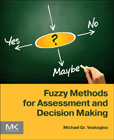
Assessment is a very important component of human activities because it helps in determining possible mistakes and in improving performance by preventing the repeat of such mistakes in future. Fuzzy Methods for Assessment and Decision Making presents the assessment of learning and problem-solving skills with qualitative grades. These methods are outcomes of the author’s research work on the subject for more than 20 years. In particular, a hybrid assessment model is developed using the Center of Gravity (COG) defuzzification technique, closed real intervals (grey numbers), neutrosophic sets and soft sets as tools. The book starts with the basic mathematical background which is needed for the understanding of its contents. The Rectangular Fuzzy Assessment Model (RFAM) of Subbotin and Voskoglou is presented next, the outcomes of which are compared to those of the GPA index. The necessary information follows regarding the learning and problem-solving processes, and the book then presents the hybrid assessment model. Dr. Voskoglou presents innovative fuzzy assessment methods, enabling the reader to assess the mean and quality performance of learning or problem-solving skills of a group of students when qualitative (linguistic) grades are used for this purpose. In the case of using linguistic grades for the assessment of a group’s skills, the classical method of calculating the mean value of the (numerical) grades cannot be applied. Also, no safe conclusions can be obtained on comparing the quality performance of two groups when the values of their GPA index are equal. The fuzzy assessment methods presented in this book solve these problems. Further, the use of neutrosophic sets enables readers to obtain safer results when there are doubts about the accuracy of the grades assigned to students, while the use of soft sets enables a parametric assessment of the group's overall performance. Furthermore, the book presents a variety of applications of Fuzzy assessment as well as the principles and application of fuzzy decision making, which is fundamental for a wide variety of AI, machine learning, computational intelligence, and knowledge engineering applications. Presents innovative fuzzy assessment methods enabling the reader to assess the mean and quality performance of learningDiscusses fuzzy logic and techniques for decision making in all domainsIncludes applications of fuzzy decision making as a hybrid model using soft sets, grey numbers, and neutrosophic sets INDICE: 1. Introduction2. Mathematical Background3. The Rectangular Fuzzy Assessment Model (RFAM)4. The Process of Learning5. Problem Solving6. A Hybrid Model for Assessing Learning and Problem Solving Skills with Qualitative Grades7. Other Applications of Fuzzy Assessment8. Fuzzy Decision Making
- ISBN: 978-0-443-23732-4
- Editorial: Morgan Kaufmann
- Encuadernacion: Rústica
- Páginas: 250
- Fecha Publicación: 01/10/2024
- Nº Volúmenes: 1
- Idioma: Inglés
